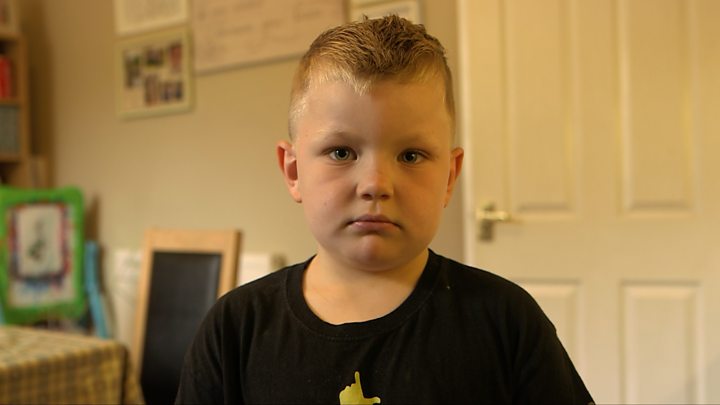Peanut allergy: Could treatment change Wrexham boy’s life

Media playback is unsupported on your device
“I’m really nervous about it. I’m not going to lie, I’m petrified.”
Lisa Valentine’s son, Bradleigh, has a potentially fatal nut allergy, so the first time she watches him being fed some peanut will be a leap of faith.
The six-year-old’s family, from Wrexham, are hoping he can take part in a ground-breaking trial to reduce his sensitivity with tiny doses of peanut.
Lisa admits “it’s a risk” but says that for Bradleigh and their family, it could transform their lives.
Birthday parties, holidays and eating out are normal and exciting events in the lives of most children while growing up. But none of it is simple for Bradleigh.
Fearing any contact with products containing nuts could trigger a reaction or even cause him to have an anaphylactic shock, Lisa takes precautions.
“We can’t just go and just eat here or there – we can’t do that and we will never do that,” she says.
“We won’t go on holiday… we won’t go on an aeroplane because we don’t want to put him at risk.”
But the family hope the immunotherapy trial could change everything.
“Our lives would be completely different,” says Lisa.
“If it worked, I don’t think I would buy him a bag of peanuts, but I don’t think we’d scrutinise the ‘may contain’, which would mean that we could go to the supermarket and just put things in.”
Around 2-4% of children in the UK have a peanut allergy, according to recent figures.
Currently, most peanut allergy therapies involve using tiny amounts of carefully prepared peanut flour. But as it can be expensive, it may never be available on the NHS.
Researchers at Imperial College London are hoping that using boiled peanuts could be a more cost-effective and safer option.
Paediatric allergist and immunologist Dr Paul Turner, responsible for the trial at St Mary’s Hospital, London, says: “We’re trying to look at different ways – cheaper ways – of doing this sort of treatment safely, that would also be affordable in the context of the NHS.”
Following the first trial, all patients who completed a year of the boiled nut therapy were able to tolerate eating six to eight peanuts without experiencing significant symptoms.
Dr Turner, who developed the idea while working abroad in Australia, said it had been very successful.
“Colleagues of mine had noticed that some children from south east Asia were allergic to peanut butter, which is made out of roasted peanuts, but not boiled peanut soup,” he said.
“That got us thinking, what happens when you boil peanuts that makes it less allergic in some people?”
Boiling peanuts reduces the amount of the peanut protein that triggers the immune system to react in an allergic reaction.
As part of this novel immunotherapy trial, patients are given small doses of boiled peanuts over an extended period of time.
Despite the trial being conducted in a strictly controlled environment by trained researches, Lisa is still concerned about the potential impact of feeding Bradleigh peanuts.
“It’s risky, isn’t it? Every time, every other week, that he has that little bit more – or it might be the first time – he could have an anaphylactic shock,” she said.
“As much as you think he’s going to be in a controlled environment where the hospital can save him, what if they can’t?
“You do worry as a mum – you are going to worry about those kinds of things, so it is risky. But it could change his life.”
To participate in the trial, Lisa will have to travel with Bradleigh from Wrexham to London every other week and stay in the city overnight.
Although it may be expensive, the family have decided to “find a way of doing it, whatever it would take”. They have also been helped by friends and family who’ve been raising money.
Lynne Regent, the chief executive of the Anaphylaxis Campaign, welcomes the potential of this type of treatment.
“I think it’s fantastic. If people are affected by severe food allergies, at the moment, really the only path they can take is avoidance and also carrying their rescue medication,” she said.
Parents are being warned by the researchers not attempt to self-medicate their children or attempt this type of therapy themselves.
They’re hoping that their own trial may lead to a cost-effective and safe treatment being available on the NHS, which could transform the lives of thousands of children and young people.

